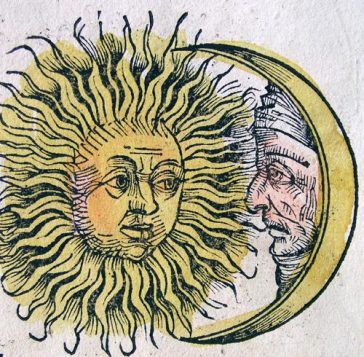
“A Note About Sky Phenomena
The known universe has been around 14 billion years — Earth 4.5 billion years. If we’re lucky, we live 100 years. When anything happens in the sky while you are alive, it is not likely rare in the cosmos. It’s not even likely rare in your lifetime. But our collective urge to think so is strong. This state of mind exists deep within us, and drives all urges to believe that our fate lies in the stars and not within ourselves.
Further, there can be events in your life that don’t repeat for hundreds or even thousands of years. But those tend to be categories of events that repeat hundreds, even thousands of times in your life. For example, the precise configuration of all eight planets in this moment will not repeat for nearly 150,000 years. But the same is true for yesterday’s configuration of planets. And tomorrow’s configuration of planets.
So it’s possible for an event to be rare, but wholly uninteresting.
A Note About the Moon
“Blue” moons (the second full moon in a calendar month) occur, on average, every two and a half to three years. An event more frequent than the Summer Olympics. But nobody ever declares “Watch out for a rare Olympics coming up!”
Total Lunar Eclipses are more frequent than that, occurring, on average, once every two years or so. Some years have two. More frequent than any Olympics at all. Occasionally, the eclipsed Moon will take on a deep red-Rose color from sunlight filtering through Earth’s atmosphere that disperses into Earth’s shadow on the darkened full Moon. Note that our collective morbid mindsets have embraced the term “Blood Moon” instead.
Once every lunar month the Moon is at perigee — the closest to Earth in the Moon’s oval orbit. Perigee coincides with the day of a Full moon about once every 30 months — 2.5 years. Some people who are adjective-challenged call this a “super moon”. Even though a such a moon is only 1% bigger than the full Moon that follows it a month later.
On January 31, 2018, all three events occur on the same calendar day: Blue Moon, Lunar Eclipse, Perigee. You get that every fifteen years or so on average. Although many time zones on Earth (all of Australia and New Zealand included) will not enjoy the Blue Moon since they will instead experience the Perigee Eclipse on calendar day February 1st.
For observing details on the Lunar Eclipse ( the only event of any real astronomical significance on January 31 ) I now, and often reference the Earth & Sky website.
As Always, keep looking up.” -Neil deGrasse Tyson, New York City